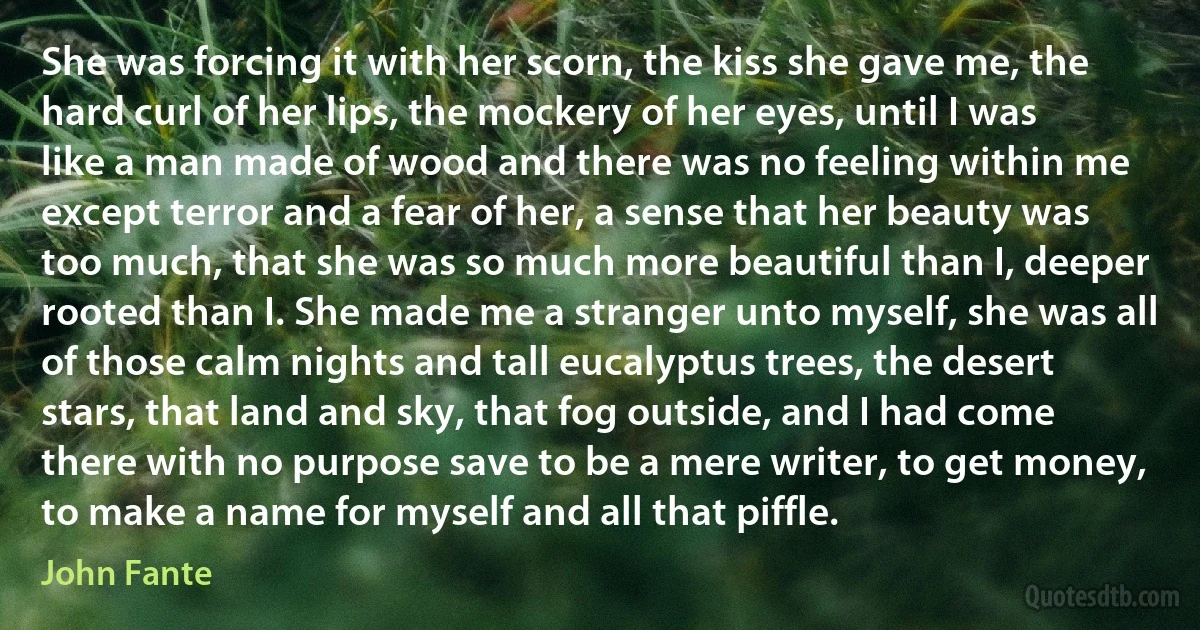Mere Quotes - page 22
Sangamon's Principle,” I said. "The simpler the molecule, the better the drug. So the best drug is oxygen. Only two atoms. The second-best, nitrous oxide-a mere three atoms. The third-best, ethanol-nine. Past that, you're talking lots of atoms.”
"So?”
"Atoms are like people. Get lots of them together, never know what they'll do.

Neal Stephenson
Let the picture imitate nothing; let it nakedly present its raison d'être. We should indeed be ungrateful were we to deplore the absence of all those things flowers, or landscape, or faces whose mere reflection it might have been. Nevertheless, let us admit that the reminiscence of natural forms cannot be absolutely banished; not yet, at all events. An art cannot be raised to the level of a pure effusion at the first step.

Jean Metzinger
The less gifted do not exist to serve the interests of the more gifted. The former are not mere things when compared to the latter, to be used as means to the latter's ends. From the moral point of view, each of us is equal because each of us is equally a somebody, not a something, the subject-of-a-life, not a life without a subject.

Tom Regan
The statute in question cannot be justified by reason of the fact that the publisher is permitted to show, before injunction issues, that the matter published is true and is published with good motives and for justifiable ends. If such a statute, authorizing suppression and injunction on such a basis, is constitutionally valid, it would be equally permissible for the legislature to provide that at any time the publisher of any newspaper could be brought before a court, or even an administrative officer (as the constitutional protection may not be regarded as resting on mere procedural details) and required to produce proof of the truth of his publication, or of what he intended to publish, and of his motives, or stand enjoined. If this can be done, the legislature may provide machinery for determining in the complete exercise of its discretion what are justifiable ends, and restrain publication accordingly. And it would be but a step to a complete system of censorship.

Charles Evans Hughes
It also became clear why the nations were expected to commence major space enterprises. Henceforth, the raw materials for industrial civilization were to be taken from Earth's lifeless sisters, not the mother world. All mines currently being gouged through Terra's crust were to be phased out within a generation and no new ones started. Henceforth, Earth must be preserved for the real treasures-its species-and man would have to look elsewhere for mere baubles like gold or platinum or iron.

David Brin
Nothing is known for certain, Isarda. All knowledge is illusion-purpose is a meaningless word, a mere sound, a reassuring fragment of melody in a cacophony of clashing chords. All is flux-matter is like these jewels. (She throws a handful of gleaming gems upon the golden surface; they scatter. When the last jewel has ceased to move, she looks up at him.) Sometimes they fall into a rough pattern, usually they do not. So as this moment, a pattern has been formed-you and I stand here speaking. But at any moment that which constitutes our beings may be scattered again.

Michael Moorcock
He [Gilels] played in an easy, natural manner, with strong but unassuming musicianship. His technique was brilliant; years later Neuhaus, still astonished, was to recall Gilels's incredible octaves in Liszt's Spanish Rhapsody. Yet Gilels was never looked upon as a mere virtuoso. As a matter of fact, his programs did not often include music pour epater le bourgeois. He played a stedy diet of Beethoven (the Hammerklavier was a work that strongly engaged his last years), Schubert, Schumann, Chopin and Brahms. In many respects, the great virtuoso who put his authoritative stamp on whatever he played was, at the same time, a thinking man's pianist.

Emil Gilels
I don't know if Native Son is a good book or a bad book. And I don't know if the book I'm working on now will be a good book or a bad book. And I really don't care. The mere writing of it will be more fun and a deeper satisfaction than any praise or blame from anybody. I feel that I'm lucky to be alive to write novels today, when the whole world is caught in the pangs of war and change.

Richard Wright
Technique shapes an aristocratic society, which in turn implies aristocratic government. Democracy in such a society can only be a mere appearance. Even now, we see in propaganda the premises of such a state of affairs. When it comes to state propaganda, there is no longer any question of democracy.

Jacques Ellul



